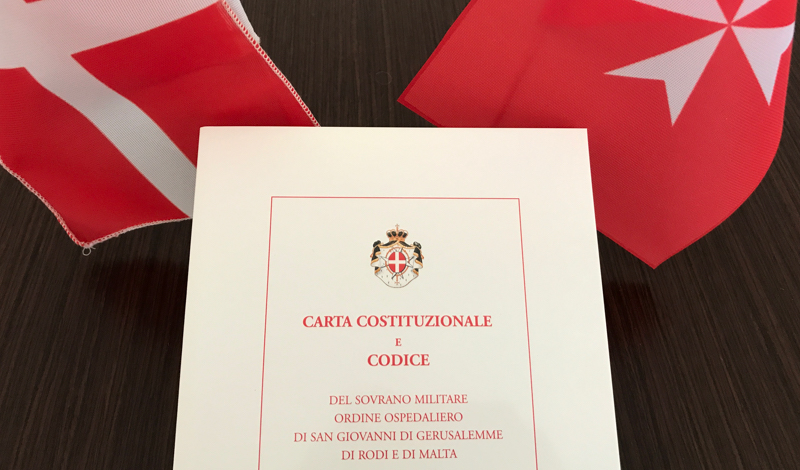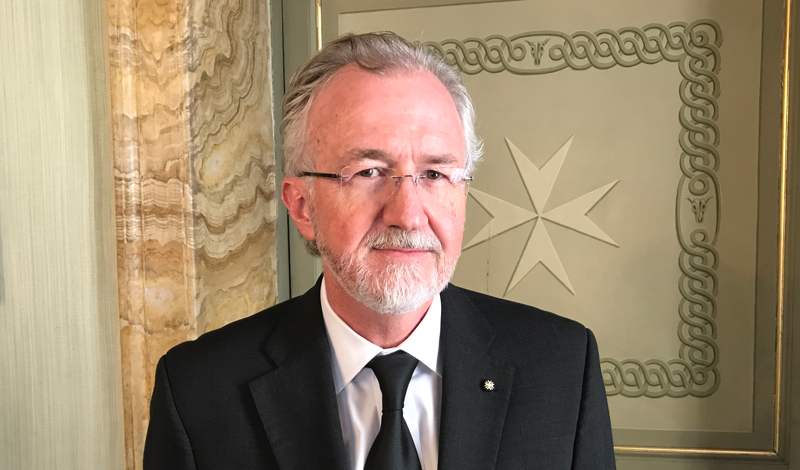The reform process for the Sovereign Order of Malta’s Constitutional Charter and Code was launched few months ago. Ambassador Mauro Bertero Gutiérrez, member of the Government Council, is coordinating the work of the Reform Steering Committee. We met with him in the Magistral Palace, Rome.
Ambassador Bertero Gutiérrez, you have been appointed coordinator of the Reform Steering Committee. What does your role involve?
The Sovereign Council of May 3 appointed a Steering Committee of nine: five members of the Sovereign Council, the Prelate, two members of the Government Council and a Professed chaplain. Considering the importance of this reform process the Lieutenant of the Grand Master has also decided to participate in the Steering Committee’s meetings.
On May 29, during the Committee’s first meeting, I was asked to coordinate the work and I accepted this important responsibility with great humility and hope. My task is to manage the work at both the central and the outer levels. Some 200 people are directly involved in the work and a large number has sent suggestions and proposals. For this process to be successful, it is of the essence for everything to function as well as possible. Among my duties during the process, I would like to point out the one related to providing information about the different stages of the reform process. I am totally committed to doing so.
Why is this reform needed?
The Sovereign Order of Malta’s recent institutional crisis has provided us with a great opportunity to update our Constitutional Charter and Code. Promulgated in 1961, it was partially revised in 1997.
I would just point out some numbers. In 1961, we had some 3,000 members, while today their number is four times as many. In the early Sixties, we had 33 Grand Priories, Subpriories and National Associations. Today we have 59. For example, the Order of Malta’s South Korean delegation was established in 2016 – an encouraging event, demonstrating the Order’s continuing expansion in the various corners of the world. Again in 1961, there were 25 countries with which we enjoyed bilateral diplomatic relations. Today there are over 100, in addition to all the multilateral relations, including those with the United Nations system. An exponential growth like this requires rules and procedures and a governance system more in step with the times, with the Order’s role and its international dimension.
What are the characteristics of the reform process?
In March, all the Order of Malta’s members were asked to send their ideas and proposals for the reform. Over 100 documents have arrived to date, coming from all over the world. We have analysed and summarised them and catalogued them by subject. We can say that their level is decidedly higher than expected. Thanks to this work we have identified ten areas to examine: First Class; Second Class; Third Class; Spirituality and theological knowledge – training and formation; Ministry of Chaplains; Role and Position of Dames; Youth; Structure of the Government and governance; Peripheral organisations (Grand Priories, Subpriories, National Association); Financial administration and Compliance.
On May 31, the Lieutenant of the Grand Master sent a letter to all Grand Priories, Subpriories and National Associations asking for the names of the members to be appointed in the groups dealing with analysing, discussing and producing concrete proposals in these cathegories. Our challenge here is to ensure that these groups are as representative and inclusive as possible, but at the same time the size of the group must enable them to work efficiently.
What is the timeframe?
The working groups have been asked to produce their results by the end of 2017. In early 2018 an international seminar will be organised in Rome, attended by the working groups and the Order’s local organisations, to analyse the proposals and reach the initial conclusions. This process must continue to be open, transparent and inclusive; the quality of the result is more important than its timing. If we realise that we need more time, we are prepared to extend the analysis and reflection process to ensure that this reform meets all expectations.
What is the role of Msgr. Angelo Becciu, the Pope’s Special Delegate in this context?
We want first of all to express our gratitude for the closeness of Pope Francis, demonstrated by this important appointment. The role of Msgr. Becciu is described in the Pope’s letter of February 4 as: “my special delegate to the distinguished Order of Malta”, you will work in “strict collaboration” with the Order’s leader for developing together “a study in view of the appropriate spiritual renovation” of the Order’s Constitution.
The reform of the Constitution and the Code is a specific responsibility of the government and all the Order’s members. The Special Delegate is accompanying the reform process through weekly meetings with the Lieutenant of the Grand Master, the Grand Commander and the Grand Chancellor. It is evident that the Special Delegate and the Holy See are particularly interested in the aspects of the spiritual life of the Order’s religious members.
Some have expressed the concern that this reform could change the Order’s identity, in particular by modifying its religious nature.
Not at all. I can reassure everyone that the spirit of this reform is to consolidate our identity as a religious-lay order, to make our healthcare and social activities even more effective and to reinforce our presence and our influence in humanitarian diplomacy at the global level. The charism of ‘tuitio fidei et obsequium pauperum’, as expressed over the nine centuries of the Order’s life, is in no way under discussion. Those who express these views are clearly not familiar with the norms for revising our constitutional laws. The Extraordinary Chapter General, which will have to approve the reform, needs a two-thirds majority. Moreover, the rules concerning the Professed members specify that not only do they have to obtain two-thirds of the chapter members’ votes, but also two-thirds of the Professed themselves. It is therefore absolutely impossible for an amendment to go against the Order’s religious nature. The idea that there are opposing factions on this matter has no foundation whatsoever. That said, different opinions can exist and are actually encouraged.











